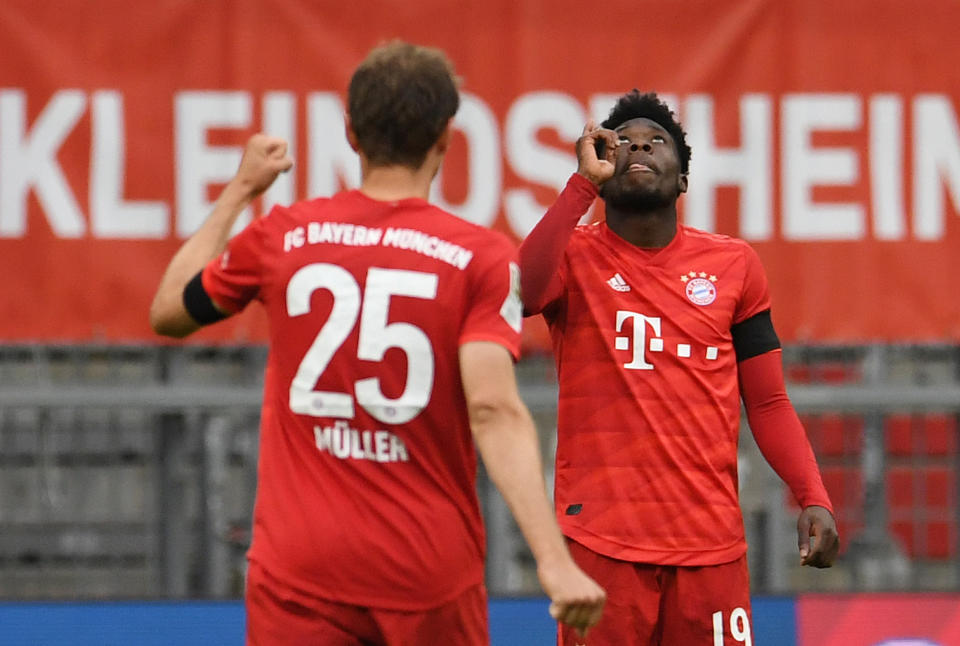The Bundesliga title is all but Bayern Munich's, thanks again to its mastery of change
You have to marvel at the longevity of Bayern Munich’s success.
For all of the club’s advantages over its German Bundesliga rivals – the budget, the commercial revenue, the size of its following – there isn’t anything inherently favoring the Bavarians. It has come by its seven straight league titles about as honestly as you can.
It doesn’t have a billionaire ownership with no compunctions about outspending everybody else, like Manchester City or Paris Saint-Germain. It doesn’t hog the domestic TV money, the way Barcelona and Real Madrid long did. Nor does it play in a globally adored league that prints money for the big clubs, like the Premier League. It isn’t the only major club in a lopsided league – in any given season, a handful of teams ought to be capable of mounting a challenge.
On Saturday, Bayern steamrolled Eintracht Frankfurt 5-2. Goals from Leon Goretzka, Thomas Muller and Robert Lewandowski built a commanding lead as teenaged Canadian left back Alphonso Davies excelled yet again. Martin Hinteregger made it a game with two quick goals for Frankfurt, before Davies stole a loose ball in front of goal and put the game out of reach.
The victory re-established Bayern’s four-point lead atop the table with seven games to go. And a win at Borussia Dortmund on Tuesday would all but eliminate the last threat to an eighth straight title, with all other teams already out of the running.

The remarkable thing is that Bayern went through a coaching change this season as the club finally grew fed up with Niko Kovac’s defensive-mindedness and replaced him with Hansi Flick. The first half of the season, Bayern sunk as low as seventh place as fresh contenders like RB Leipzig seemed ready to break the hegemony at last. But here we are, at the business-end of the season, and another Bayern title feels inevitable.
The other factor that’s so striking is that Bayern is actually in the midst of a bit of a rebuilding process, seeing off club legends Arjen Robben and Franck Ribery this summer. While veterans such as Muller and goalkeeper Manuel Neuer have been rejuvenated under Flick and signed new contracts, an entirely new core is forming around them.
David Alaba remains an imperious defender alongside Jerome Boateng. But the club also landed French defenders Benjamin Pavard and Lucas Hernandez over the summer, who are both 24. Leon Goretzka, 25 and in his second season at the club, has turned into a world-class playmaker. Wingers Serge Gnabry and Kingsley Coman, aged 24 and 23, are hard to stop on the wings most of the time. Youth product Joshua Kimmich, 25, is a generational holding midfielder.
And then there’s Davies, the remarkable Davies, the Liberian-Canadian refugee who won’t turn 20 until November. He joined Bayern from the Vancouver Whitecaps in January of 2019 but, courtesy of his blinding speed, was thought to be a winger. Bayern rebuilt him into a wing-back, however, allowing Alaba to move centrally. And Davies, as it turns out, has such a keen mind for the game that he almost instantly grew into an elite defender.
On Saturday, he harassed Eintracht’s wingers and read the game so much quicker than his opponents that his vision led directly to two goals. He read a loose ball fastest in the first half and teed up Muller. Then he realized the Frankfurt defense had made a mistake in its own box before anyone else and pounced for a goal of his own.
But this quick adjustment, this rapid pivot to a new situation, has been a feature of this Bayern dynasty, which also yielded a Champions League title in 2013. Last season, Bayern snuck past a seemingly destined Dortmund even though the Bavarians were clearly stuck between generations, learning to rely on new players along the way. The season before, Bayern survived an early season revolt against Carlo Ancelotti and a subsequent managerial change to win the Bundesliga by 21 points regardless. In 2016-17, Bayern seamlessly moved on from three triumphant seasons under Pep Guardiola – winning the league by double-digits every year – to the very different Ancelotti. The key to Bayern’s success isn’t just its talent, it’s an uncanny capacity to change on the fly.
Since Guardiola has left, it seemed that every season was the year when Bayern’s run would finally end, as it found itself in some new, unforeseen trouble. Yet every time, it also found a way out, consolidating momentum in the stretch run while its competitors imploded.
This time around, Bayern has charged for the title with a younger and more talented team than it has put together in more than a decade. And, somehow, the Bavarians are now as well-positioned for the future as they have been in quite some time.
Leander Schaerlaeckens is a Yahoo Sports soccer columnist and a sports communication lecturer at Marist College. Follow him on Twitter @LeanderAlphabet.
More from Yahoo Sports:


